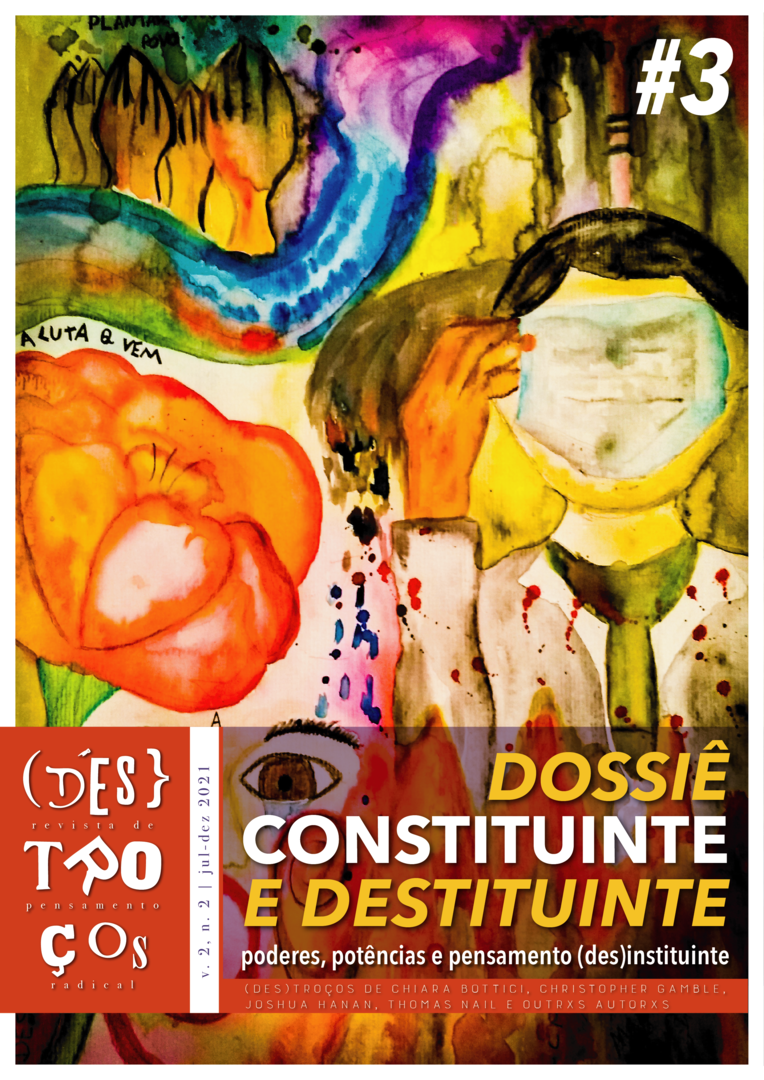Power is a lobster: scenes of a double articulation between constituent and constituted
Published 2022-04-17
Keywords
- philosophy of power,
- constitutionalism,
- constituent power,
- constituted power,
- performativity
How to Cite
Copyright (c) 2022 (Des)troços: journal of radical thought

This work is licensed under a Creative Commons Attribution-NonCommercial 4.0 International License.
Abstract
This experiment article is a bet on the understanding of power in its performativity. Beyond the positions of classical constitutionalism that imprison the constituent in the constituted or the so-called radical positions that decree the death of the constituted in favor of a permanent constituent, we affirm that there is neither a constituent power nor a constituted power. What exists is just the power. And this power can only be understood in operation. It is in the relation that things show themselves. And in this relation, power is always shown as a constituent and constituted at the same time. It is precisely in this double articulation that it reveals itself. The relationship is not merely one of cause and consequence, but one of the simultaneous constitution. There is no anteriority in the time and space of one dimension over another. What exists is a process of overdetermination without beginning or end.
Downloads
References
- BARAD, Karen. Performatividade pós-humanista: para entender como a matéria chega à material. Trad. Thereza Rocha. Vazantes, v. 1, n. 1, pp. 7-34, 2017.
- BARBA, Eugenio; SAVARESE, Nicola. A arte secreta do ator: dicionário de antropologia teatral. Campinas: Editora da Unicamp, 1995.
- BONAVIDES, Paulo. Curso de direito constitucional. 33. ed. São Paulo: Malheiros, 2018.
- BUTLER, Judith. A vida psíquica do poder: teorias da sujeição. Trad. Rogério Bettoni. Belo Horizonte: Autêntica Editora, 2017.
- BUTLER, Judith. Excitable speech: a politics of the performative. New York: Routledge, 1997.
- CATTONI DE OLIVEIRA, Marcelo Andrade. Democracia sem espera e processo de constitucionalização: uma crítica aos discursos oficiais sobre a chamada “transição política brasileira”. Revista Anistia Política e Justiça de Transição, n. 3, pp. 367-399, jan./jun. 2010.
- CHUEIRI, Vera Karam de. Constituição radical: uma ideia e uma prática. Revista da Faculdade de Direito UFPR, n. 58, pp. 25-36, 2013.
- DELEUZE, Gilles; GUATTARI, Félix. Mil platôs: capitalismo e esquizofrenia 2. Vol. 1. São Paulo: Editora 34, 2011.
- DELEUZE, Gilles; GUATTARI, Félix. Mil platôs: capitalismo e esquizofrenia 2. Vol. 4. São Paulo: Editora 34, 2012a.
- DELEUZE, Gilles; GUATTARI, Félix. Mil platôs: capitalismo e esquizofrenia 2. Vol. 5. São Paulo: Editora 34, 2012b.
- DELEUZE, Gilles. Conversações (1979-1990). Trad. Peter Pál Pelbart. São Paulo: Editora 34, 2013.
- GAMBLE, Christopher N.; HANAN, Joshua S.; e NAIL, Thomas. What is new materialism? Angelaki, v. 24, n. 6, pp. 111-134, 2019.
- LAPOUJADE, David. Deleuze, os movimentos aberrantes. São Paulo: n-1, 2015.
- MATOS, Andityas Soares de Moura Costa. Estado de exceção, desobediência civil e desinstituição: por uma leitura democrático-radical do poder constituinte. Revista Direito & Práxis, v. 7, n. 4, pp. 43-95, 2016.
- MENDES, Gilmar Ferreira; BRANCO, Paulo Gustavo Gonet. Curso de direito constitucional. 7. ed. São Paulo: Saraiva, 2012.
- MOREIRA, Eduardo; ABREU, Marcio; ANDRÉ, Paulo. Outros. Belo Horizonte: Javali, 2020.
- MOREIRA, Eduardo; ABREU, Marcio. Nós. Belo Horizonte: Javali, 2018.
- NEGRI, Antonio. O poder constituinte: ensaio sobre as alternativas da modernidade. Rio de Janeiro: Lamparina, 2015.
- PASSÔ, Grace; ABREU, Marcio; NAIRA, Nadja. Preto. Rio de Janeiro: Cobogó, 2019.
- RANCIÈRE, Jacques. O espectador emancipado. Trad. Ivone C. Benedetti. São Paulo: WMF Martins Fontes, 2012.
- RANCIÈRE, Jacques. O método da cena. Trad. Angela Marques. Belo Horizonte: Quixote Do, 2021.
- SILVA, José Afonso da. Curso de direito constitucional positivo. 33. ed. São Paulo: Malheiros, 2010.
- YUNG, Carl G. ... [et al.]. O homem e seus símbolos. Rio de Janeiro: HarperCollins Brasil, 2016.

